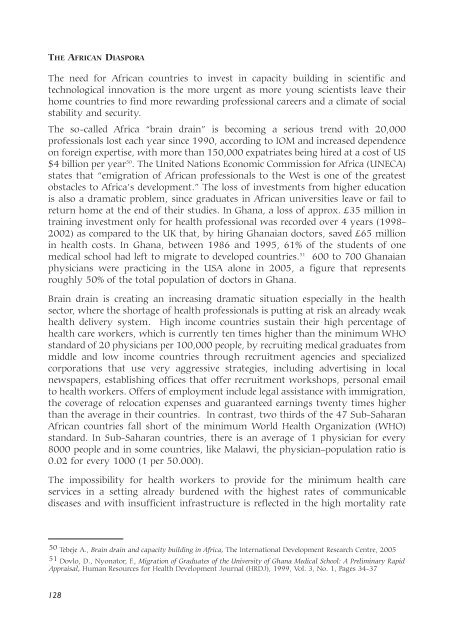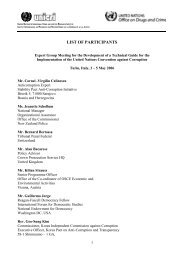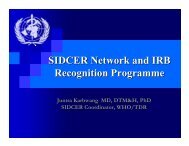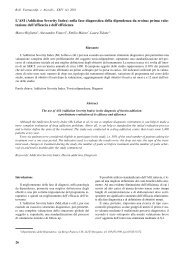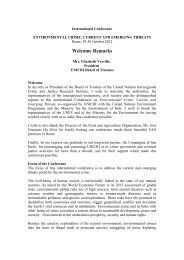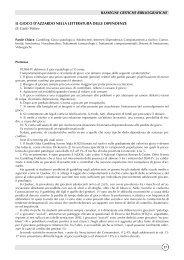Biomedical Research in Developing Countries - UNICRI
Biomedical Research in Developing Countries - UNICRI
Biomedical Research in Developing Countries - UNICRI
You also want an ePaper? Increase the reach of your titles
YUMPU automatically turns print PDFs into web optimized ePapers that Google loves.
THE AFRICAN DIASPORA<br />
The need for African countries to <strong>in</strong>vest <strong>in</strong> capacity build<strong>in</strong>g <strong>in</strong> scientific and<br />
technological <strong>in</strong>novation is the more urgent as more young scientists leave their<br />
home countries to f<strong>in</strong>d more reward<strong>in</strong>g professional careers and a climate of social<br />
stability and security.<br />
The so-called Africa “bra<strong>in</strong> dra<strong>in</strong>” is becom<strong>in</strong>g a serious trend with 20,000<br />
professionals lost each year s<strong>in</strong>ce 1990, accord<strong>in</strong>g to IOM and <strong>in</strong>creased dependence<br />
on foreign expertise, with more than 150,000 expatriates be<strong>in</strong>g hired at a cost of US<br />
$4 billion per year 50 . The United Nations Economic Commission for Africa (UNECA)<br />
states that “emigration of African professionals to the West is one of the greatest<br />
obstacles to Africa’s development.” The loss of <strong>in</strong>vestments from higher education<br />
is also a dramatic problem, s<strong>in</strong>ce graduates <strong>in</strong> African universities leave or fail to<br />
return home at the end of their studies. In Ghana, a loss of approx. £35 million <strong>in</strong><br />
tra<strong>in</strong><strong>in</strong>g <strong>in</strong>vestment only for health professional was recorded over 4 years (1998-<br />
2002) as compared to the UK that, by hir<strong>in</strong>g Ghanaian doctors, saved £65 million<br />
<strong>in</strong> health costs. In Ghana, between 1986 and 1995, 61% of the students of one<br />
medical school had left to migrate to developed countries. 51 600 to 700 Ghanaian<br />
physicians were practic<strong>in</strong>g <strong>in</strong> the USA alone <strong>in</strong> 2005, a figure that represents<br />
roughly 50% of the total population of doctors <strong>in</strong> Ghana.<br />
Bra<strong>in</strong> dra<strong>in</strong> is creat<strong>in</strong>g an <strong>in</strong>creas<strong>in</strong>g dramatic situation especially <strong>in</strong> the health<br />
sector, where the shortage of health professionals is putt<strong>in</strong>g at risk an already weak<br />
health delivery system. High <strong>in</strong>come countries susta<strong>in</strong> their high percentage of<br />
health care workers, which is currently ten times higher than the m<strong>in</strong>imum WHO<br />
standard of 20 physicians per 100,000 people, by recruit<strong>in</strong>g medical graduates from<br />
middle and low <strong>in</strong>come countries through recruitment agencies and specialized<br />
corporations that use very aggressive strategies, <strong>in</strong>clud<strong>in</strong>g advertis<strong>in</strong>g <strong>in</strong> local<br />
newspapers, establish<strong>in</strong>g offices that offer recruitment workshops, personal email<br />
to health workers. Offers of employment <strong>in</strong>clude legal assistance with immigration,<br />
the coverage of relocation expenses and guaranteed earn<strong>in</strong>gs twenty times higher<br />
than the average <strong>in</strong> their countries. In contrast, two thirds of the 47 Sub-Saharan<br />
African countries fall short of the m<strong>in</strong>imum World Health Organization (WHO)<br />
standard. In Sub-Saharan countries, there is an average of 1 physician for every<br />
8000 people and <strong>in</strong> some countries, like Malawi, the physician–population ratio is<br />
0.02 for every 1000 (1 per 50.000).<br />
The impossibility for health workers to provide for the m<strong>in</strong>imum health care<br />
services <strong>in</strong> a sett<strong>in</strong>g already burdened with the highest rates of communicable<br />
diseases and with <strong>in</strong>sufficient <strong>in</strong>frastructure is reflected <strong>in</strong> the high mortality rate<br />
50 Tebeje A., Bra<strong>in</strong> dra<strong>in</strong> and capacity build<strong>in</strong>g <strong>in</strong> Africa, The International Development <strong>Research</strong> Centre, 2005<br />
51 Dovlo, D., Nyonator, F., Migration of Graduates of the University of Ghana Medical School: A Prelim<strong>in</strong>ary Rapid<br />
Appraisal, Human Resources for Health Development Journal (HRDJ), 1999, Vol. 3, No. 1, Pages 34-37<br />
128


